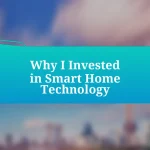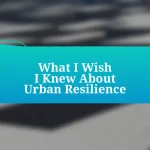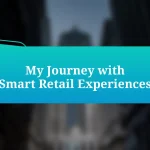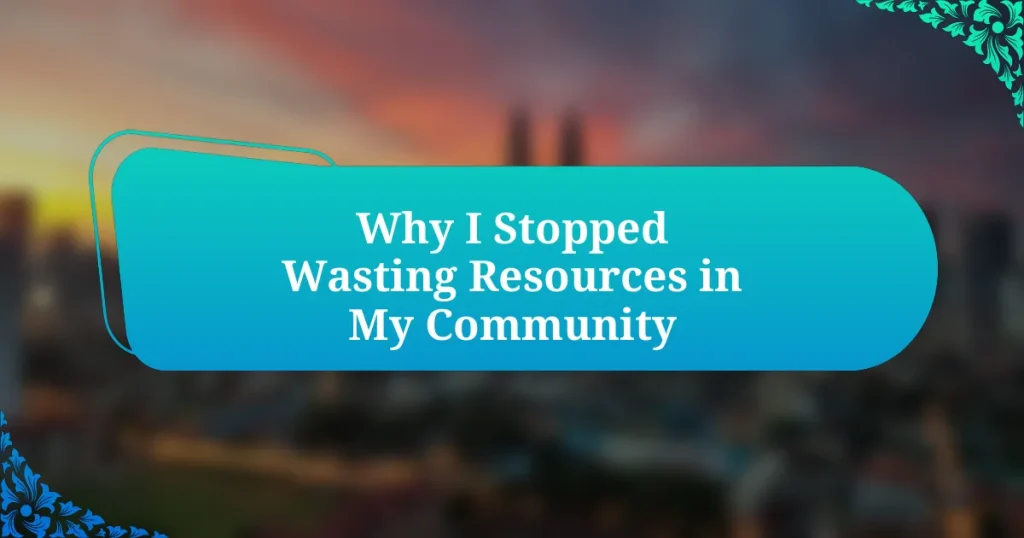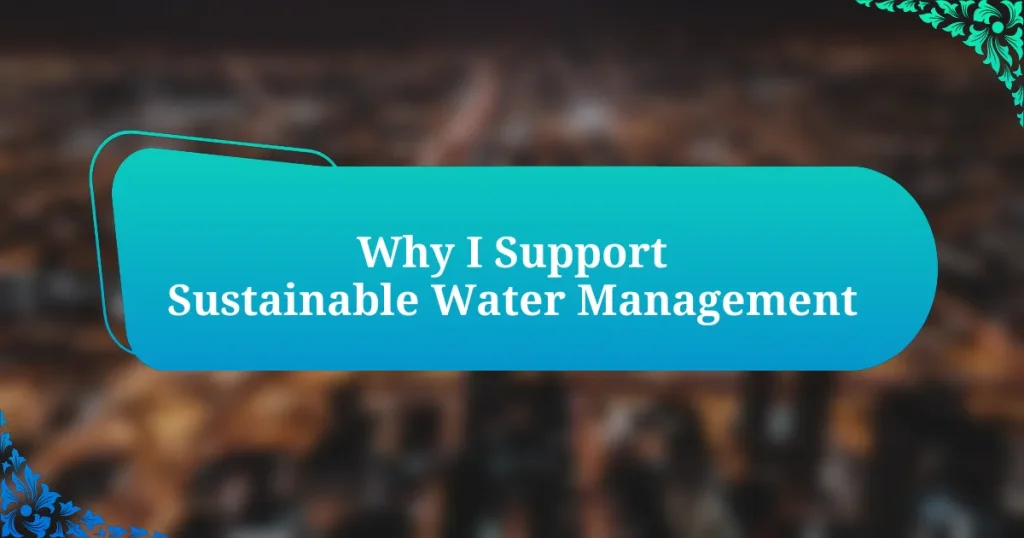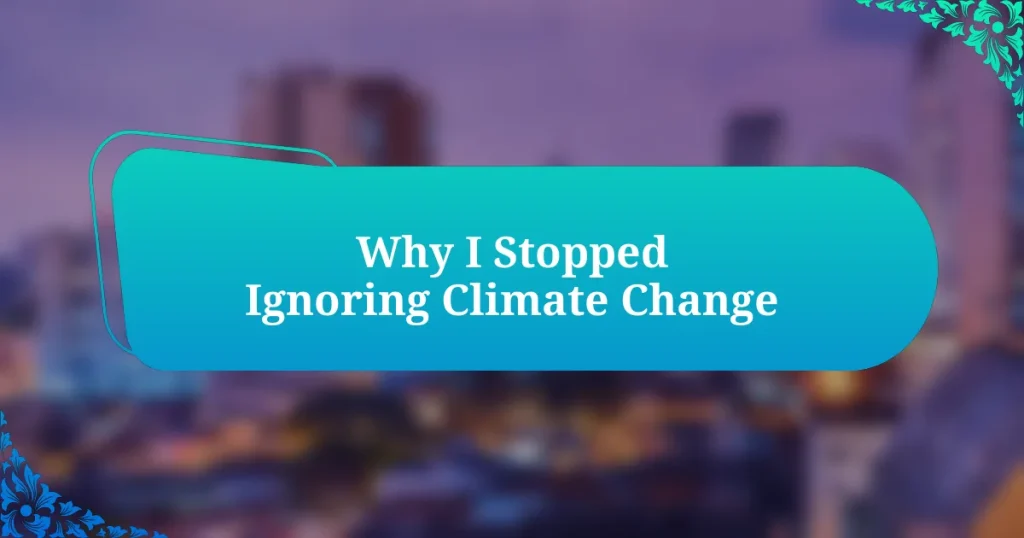Key takeaways:
- Smart Nation Initiatives aim to enhance urban living through technology, promoting walkable neighborhoods and reducing car dependency.
- Sustainable transport fosters community connections, reduces carbon footprints, and encourages healthier lifestyles.
- Over-reliance on cars contributes to disconnection, environmental issues, and financial burdens, whereas reducing car usage improves social interactions and mental well-being.
- Embracing alternative transportation options, like biking and public transit, can lead to personal enjoyment, community engagement, and reduced stress levels.
Author: Evelyn Hartley
Bio: Evelyn Hartley is an acclaimed author known for her gripping psychological thrillers and richly woven narratives. With a background in psychology and a keen interest in human behavior, Evelyn’s work delves deep into the complexities of the mind, creating unsettling yet compelling tales. Her debut novel, “Shadows of the Mind,” received numerous accolades and was a bestseller, establishing her as a prominent voice in contemporary fiction. When she’s not writing, Evelyn enjoys exploring the great outdoors and immersing herself in the world of classic literature. She lives in Portland, Oregon, with her rescue dog, Jasper.

Understanding Smart Nation Initiatives
Smart Nation Initiatives focus on leveraging technology to improve urban living and enhance citizens’ quality of life. I remember my first encounter with these initiatives during a community meeting; the energy in the room was palpable as we discussed smarter public transportation systems. It made me wonder—how can we shape our cities into more sustainable living spaces that foster connections rather than isolation?
I often reflect on how these initiatives promote a shift away from car dependency, leading to more walkable neighborhoods. Just the other day, I took a stroll through a newly developed pedestrian-friendly area and felt a sense of freedom and community that I hadn’t experienced while driving. It struck me then that embracing Smart Nation concepts empowers us to reclaim our public spaces, making them vibrant hubs for interaction and creativity.
Through investments in smart technologies, these initiatives aim to create integrated systems that streamline transportation, reduce congestion, and minimize environmental impact. I once found myself stuck in traffic for hours, frustrated by the sheer volume of cars. That experience sparked my curiosity about how data-driven solutions could revolutionize urban mobility and ultimately lead to a healthier, more connected society. What if we could harness such innovations to redefine our relationship with our cities?

Importance of Sustainable Transport
Sustainable transport is not just an environmental necessity; it’s a pathway to a more connected community. I recall a weekend when my friends and I decided to use bicycles instead of cars for a trip around the city. The experience was refreshing — the air was crisp, conversations flowed effortlessly, and I felt a sense of belonging that often gets lost in the isolation of my vehicle.
Investing in sustainable transport also reduces our carbon footprint significantly. I remember reading about a city that transformed its public transportation with electric buses. The positive impact on air quality was dramatic — it made me realize how our collective choices can lead to profound changes in our urban environments. Imagine living in a place where clean air is not a luxury but a standard.
Moreover, embracing sustainable options encourages healthier lifestyles. I often think back to the joy I felt when I walked to a local café instead of driving there. It was about more than just the exercise; it was about engaging with my surroundings and discovering small businesses I had previously overlooked. Could it be that by choosing sustainable transport, we not only benefit our environment but also rediscover the joy of our local communities?

Impact of Over-reliance on Cars
Relying heavily on cars can lead to a sense of disconnection from our neighborhoods. I remember driving home from work one evening, stuck in traffic, feeling utterly isolated despite being surrounded by other drivers. That moment made me realize how often we miss the small details — the local art displays, the laughter of children playing in a park, or even the aroma of street food — because we are so focused on getting from point A to point B in our cars.
The environmental cost of over-reliance on automobiles is staggering, contributing significantly to air pollution and greenhouse gas emissions. I once attended a workshop where an expert explained how just one less car per household could dramatically reduce carbon emissions. It made me think about my own driving habits — the one trip to the grocery store that could be replaced with a pleasant walk or bike ride, ultimately enhancing both my well-being and the health of the planet.
Furthermore, the financial burden associated with car ownership can’t be ignored. I used to cringe at the expenses: fuel, maintenance, insurance — they add up quickly! When I considered alternatives like carpooling or even using public transport, I began to recognize the potential for increased savings and less stress. Isn’t it intriguing how stepping away from our cars can actually free us, both financially and mentally?

Benefits of Reducing Car Usage
Relying less on cars opened up a whole new world for me. Transitioning to biking for short trips not only reduced my carbon footprint but also revitalized my sense of adventure. I still remember the first time I rode to the coffee shop instead of driving; the crisp morning air infused a sense of freedom and joy that I hadn’t felt in ages. Have you ever felt the thrill of feeling the wind rush past you while you pedal?
In addition to the environmental impact, reducing car usage significantly enhances social connections. Since I started walking to nearby parks, I’ve had more spontaneous chats with neighbors and made a couple of new friends along the way. Each interaction made me realize how much richer our lives could be if we simply slowed down and engaged with our surroundings. How often do we miss those opportunities while speeding past in a car?
Another surprising benefit was the improvement in my mental well-being. I used to feel stressed during my daily commute, but now, those moments spent walking or biking allow me to reflect and unwind. There’s something therapeutic about being present in my environment — noticing the changing seasons or the laughter of children playing. Isn’t it remarkable how reducing car dependence can nurture your mind and soul?

My Journey to Less Driving
Transitioning to less driving was a gradual but eye-opening process for me. I remember the moment I decided to leave my car at home one Saturday and walk to a friend’s gathering. I felt a bit anxious at first, worrying about the time it would take, but that hour spent strolling through my community led to the discovery of a quaint little bookstore I had never noticed before. Have you ever had an unexpected joy change your day?
As I continued this journey, biking became my go-to for errands. One day, while pedaling to the grocery store, I crossed paths with a local farmer who was selling fresh produce roadside. I stopped to chat, and he shared stories about his farm that I never would’ve learned driving. That connection to my local community became addictive and made me realize how living more actively can ignite unexpected relationships.
Adopting this new lifestyle has changed my perspective on what mobility means. I recall feeling overwhelmed by traffic jams and parking struggles, but now I relish the moments spent wandering down new paths. Each outing teaches me to appreciate the little things, from the warmth of the sun on my skin to the laughter of children playing in the park. Isn’t it amazing how stepping away from the driver’s seat can actually bring you closer to life itself?

Alternative Transportation Options
Exploring alternative transportation options opened up new horizons for me. I vividly remember hopping on a city bus for the first time in years. It felt liberating to sit back, relax, and watch the world go by—something I often missed when driving. Have you ever noticed the variety of people on public transport? It’s a microcosm of the community, filled with stories and experiences that would otherwise remain hidden in the isolation of a car.
Carpooling also became a game-changer in my weekly routine. I initiated a ride share with a couple of colleagues for our commute, and it transformed our morning drives into lively discussions. Who would have thought that sharing a ride could lead to deeper connections and even collaborative ideas at work? It’s funny how a simple shift can create bonds that reinforce both teamwork and friendship.
Even walking has become a treasured part of my day. I’ve adopted the habit of leaving for appointments a bit early, allowing time for a leisurely stroll. One morning, I stumbled upon a vibrant street fair filled with local crafts and food. The joy of that spontaneous experience is something that car travel could never offer. Isn’t it incredible how prioritizing alternative transportation can weave together the fabric of our community in unexpected ways?

Embracing a Car-free Lifestyle
Embracing a car-free lifestyle has allowed me to truly appreciate the nuances of my environment. One day, while cycling through the park, I felt the crisp air invigorate my senses and the colors of nature come alive. It’s an experience that a car simply can’t replicate; the freedom to feel the wind on your face and connect with your surroundings is unmatched. Don’t you ever crave that kind of connection to the world around you?
As I shifted to relying less on my car, my social life blossomed. I joined a local walking group which not only kept me fit but also introduced me to wonderful individuals who share a passion for community. Sharing stories while traversing familiar streets made me realize how much I had overlooked; walking became both exercise and a chance to forge genuine connections. Isn’t it amazing how transportation can transform not just our physical journey, but our emotional one as well?
Additionally, I noticed a significant decrease in my stress levels when I moved away from driving. Now, instead of battling traffic, I immerse myself in the rhythm of my bike commute, finding solace in the predictable suburb crescendos of morning life. I often reflect on how much I once felt trapped behind the wheel, and I can’t help but wonder: what other joys have we neglected in the rush of everyday driving? Embracing this new way of life feels not just like a choice, but a rediscovery.





